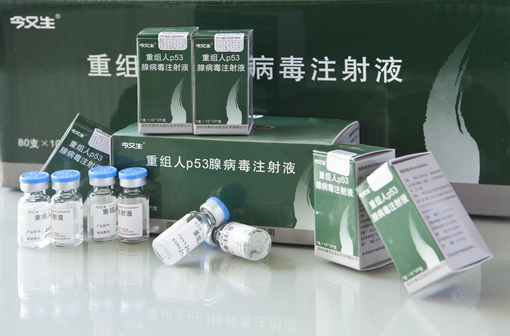News
- SiBiono International …
SiBiono International Gene Therapy Sympo… - Cooperation Signing Ce…
Cooperation Signing Ceremony between SiB… - Ms WeiXu, CEO of SiBio…
Ms WeiXu, CEO of SiBiono coming back fro…
Clinical Studies
Home - Pro Info - Clinical Studies
Phase I clinical trial of intra-tumoral administration of Gendicine® in patients with laryngeal squamous cell carcinoma was completed in Beijing Tongren Hospital to confirm its safety. The results indicated that the main side effect was fever at the dose of 1x1012 vp (virus particles).The dosage adopted in phase II clinical trial was 1x1012vp/ injection/ week.
By November 2005, 4-6 years follow-up result of the 12 patients participated in the phase I clinical trial showed that 11/12 patients were alive with median survival of 5.9 years. Follow-up ranged from 4.0 to 6.4 years and the 5-year survival rate was 91.7%. The oldest patient enrolled aged 79 had poor to moderate differentiation of squamous cell carcinoma died of liver metastasis at the age of 83 ( 4 y post-diagnosis). It was reported in Am. Joint Committee on Cancer (AJCC) in 2002 that 5-year survival rate of laryngeal squamous cell carcinoma (LSCC) was 68.6-71.1% for stage I, 55.5-59.9% for stage II, and 46.4-50.1% for stage III, but 69.96% survival from different stages of LSCC was reported in this study in China.
A multicenter, randomized controlled phase II /III clinical trial were conducted on patients with head and neck squamous cell carcinoma (HNSCC). The majority (85%) of them had nasopharyngeal cancer, and was divided randomly into two groups: radiotherapy with gene therapy (GTRT) and without gene therapy but radiotherapy only (RT). There were no significant differences (p>0.05) in age, sex, clinical stage, or tumor size between the two groups of patients. Conventional or three-dimensional conformal radiotherapy was used at doses of 70 Gy administered in 35 fractions over 7–8 weeks for the RT group. For the GTRT group, Gendicine® was given each week at a dose of 1×1012 VP 3 days before radiotherapy, for a total of 8 weeks. Radiotherapy procedures are the same in both groups. Objective tumor response was evaluated by computed tomography (CT) or magnetic resonance imaging (MRI) according to the tumor response criteria of World Health Organization (WHO). The data showed that the response rate in the GTRT group was 93%, with 64% showing complete regression (CR) and 29% partial regression (PR). The response rate in the RT group was 79% with 19% of the patients showing CR and 60% PR. There is a significant difference (p<0 01="" between="" the="" two="" groups="" in="" terms="" of="" both="" the="" cr="" rate="" and="" the="" pr="" rate="" the="" cr="" rate="" in="" the="" gtrt="" group="" was="" 3-fold="" higher="" than="" that="" in="" the="" rt="" group="" we="" concluded="" that="" gendicine="" in="" combination="" with="" radiotherapy="" showed="" obvious="" synergistic="" effect="">By September 2005, the analysis of result for the 78 patients participated in the phase II/ III clinical trial including 40 cases in the GTRT group and 38 in the RT Group was announced. The mean follow-up time was 39.4 months showing that the median disease-free survival time, 3-year disease-free survival rate and 3-year overall survival rate are 38 months, 74.3% and 78.8% respectively in the GTRT group, and 32 months, 61.7% and 69.4% in the RT group.
Contact us
Add:19,1st Science & Technology Middle Road,Shenzhen Hi-Tech Industry Park(Middle),Shenzhen,P.R.China
Tel:400-6828-666 (086)0755-33065208 0755-33065255
SIBIONO Copyright 粤ICP备14054565号-1












